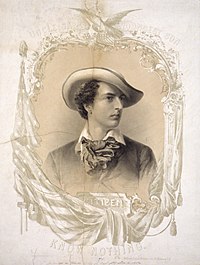Know-Nothing Party
|
American Party
|
|
|---|---|

Citizen Know Nothing: the Know Nothing Party's nativist ideal
|
|
| First Leader | Lewis Charles Levin |
| Founded | 1844 |
| Dissolved | 1860 |
| Split from | Whig Party |
| Succeeded by | Constitutional Union Party |
| Headquarters | New York, New York, U.S. |
| Secret wing | Order of the Star Spangled Banner |
| Ideology |
American nationalism Right-wing populism Anti-Catholicism Republicanism Nativism |
| Political position | Right-wing |
| Religion | Protestantism (Temperance) |
| Colors |
Blue, red, white (American colors) |
The Native American Party, renamed the American Party in 1855 and commonly known as the Know Nothing movement, was an American political party that operated nationally in the mid-1850s.
Know Nothings were an anti-Catholic and anti-immigrant nativist party, emphasizing purity of elections by blocking "impure" foreigners. In most places it lasted only a year or two, then disintegrated because of weak local leaders, a lack of nationally prominent leaders, and a deep split over slavery. Many ex-members voted Republican when the Democrats embraced immigrants. The party is remembered for anti-Catholicism, based on Protestant fears that Catholic priests and bishops would directly control a large bloc of voters. In the South, it gave much less emphasis to Catholicism.
Among the party's few prominent leaders were Congressman Nathaniel P. Banks of Massachusetts and former U.S. Representative Lewis C. Levin. The American Party nominated former President Millard Fillmore in the 1856 presidential election, although he kept quiet about his membership.
Anti-Catholicism had been a factor in colonial America but played little role in American politics until the arrival of large numbers of Irish and German Catholics in the 1840s. It then reemerged in nativist attacks on Catholic immigration. It appeared in New York politics as early as 1843, under the banner of the American Republican Party. The movement quickly spread to nearby states, using that name or Native American Party or variants of it. They succeeded in a number of local and Congressional elections, notably in 1844 in Philadelphia, where the anti-Catholic orator Lewis Charles Levin was elected U.S. Representative from Pennsylvania's 1st District. In the early 1850s, numerous secret orders grew up, of which the "Order of United Americans" and the Order of the Star Spangled Banner came to be the most important. They merged in New York in the early 1850s as a secret order that quickly spread across the North, reaching non-Catholics, particularly those who were lower middle class or skilled workmen.
...
Wikipedia
